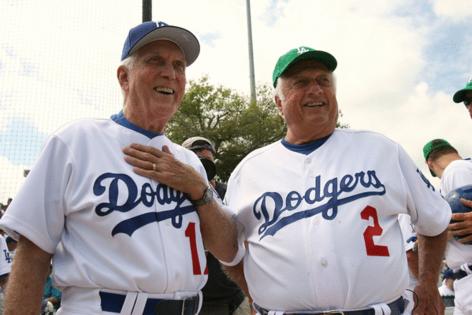Martin Schram: Watching America's future and pastime intersect
Published in Op Eds
The first cup of black coffee had not quite done its job, as I was slowly paging through Wednesday morning’s New York Times. But page B11 sure did.
There, filling up the entire page, was my childhood. Two big headlines stretched across the top and the middle of page B11 evoked a rush of memories that were very special – yet quite different. One memory was pure fun. The other, powerful and meaningful to the real making of America.
The headlines reported that Whitey Herzog and Carl Erskine, two famous baseball stars in their mid-90s, had just died. Just reading their names rekindled memories about my fleeting but forever moments with two of their teammates who were more than just sports stars – they were cultural constellations. We’re talking now about Satchel Paige and Jackie Robinson. They were icons of the era when America belatedly but finally began lurching into racial and civil rights change.
Whitey & Satchel & Me: Reading Herzog’s obit, my mind began replaying a 1957 moment when I was one of the kids waiting for autographs after a night game at the old minor league Miami Stadium. Paige, baseball’s famously aged pitcher with his ageless arm, was still at it. He’d unretired to star for Bill Veeck’s new AAA minor league Miami Marlins. (Remember: Paige had seemed destined for a career in the Negro leagues until the Brooklyn Dodgers shattered major league segregation by signing Robinson a decade earlier. Next, Veeck, owner of the Cleveland Indians, signed outfield star Larry Doby, then Paige.)
Paige was always the last to leave – and they’d turned out the stadium lights before Paige finally emerged with a young Herzog.
“No autographs tonight – way too dark to see,” Paige told us. So all the kids left. Except one. Holding a red bound autograph book, I looked up at this tall, slim historic icon and decided to go for it.
“Oh, I can imagine how hard it must be for your old eyes to see tonight, Mister Paige,” I said. “But my young eyes can still see quite clearly.”
Herzog convulsed in guffaws. Paige almost did too – but caught himself and launched into a bit of vaudeville comedy: “OLD EYES? I STILL GOT YOUNG EYES! I’LL SHOW YOU. GIVE ME THAT BOOK!”
The old star took my book and, with a swoosh of loops, signed: “Satchel Paige.” The Legend returned my book with a flourish of major league triumph. End of story.
(Except this: Years later, when I was in college, my parents moved overseas. And my poor mom, rushing to downsize and depart, accidentally threw out my red autograph book filled with spring training signatures of baseball’s greats. It still hurts.)
Jackie & Me: Erskine’s obit told tales of his friendship with Robinson. And that clicked a mental replay of my most special moment with a childhood (and adulthood) hero. It actually occurred when I was a Newsday Washington correspondent. I had arrived early for a New York City interview with Gov. Nelson Rockefeller, when his earlier guest emerged into the lobby. He was a large, white-haired Black man who walked like an old man, slowly and with difficulty. Working to make sure I didn’t seem like the world’s oldest autograph-seeking kid, I introduced myself to Jackie Robinson. My idol took hold of my arm and asked if I could walk him outside and help him cross the busy Central Park West to his car and driver. And yes – I was replaying the thrill of seeing him racing to the plate, sliding under Yogi’s mitt – stealing home in the 1955 World Series! Just the other day.
Diabetes had crippled his leg, diminished his vision. After his car drove off, I put my childhood memories where they belonged, composed myself and interviewed New York’s governor. Robinson died in 1972 at just 53.
The best tribute to Robinson I’ve seen was written by his Dodger teammate and friend, Erskine, in his book: “What I Learned From Jackie Robinson.” The Erskines’ fourth child, Jimmy, had been born with Down syndrome. He was raised by his parents, medaled in the Special Olympics, had a career in a restaurant and died last November at age 63.
"I often felt Jackie came into my life to teach me how to channel energy and anger toward what was happening around me with Jimmy and society's nonacceptance of Down syndrome and other birth defects,” Erskine wrote. “… Jackie had his Rookie of the Year and his Hall of Fame plaque, and my Jimmy went on to earn gold medal after gold medal in the Special Olympics. I wish Jackie had lived to see those days because Jackie had a lot to do with Jim’s success.”
Today, amid the tumult and craftily faked anger that passes as news, it helps to remind each other that what has always made America great has been the values of our shared pastimes – never our politics.
__
___
©2024 Tribune Content Agency, LLC.







Comments